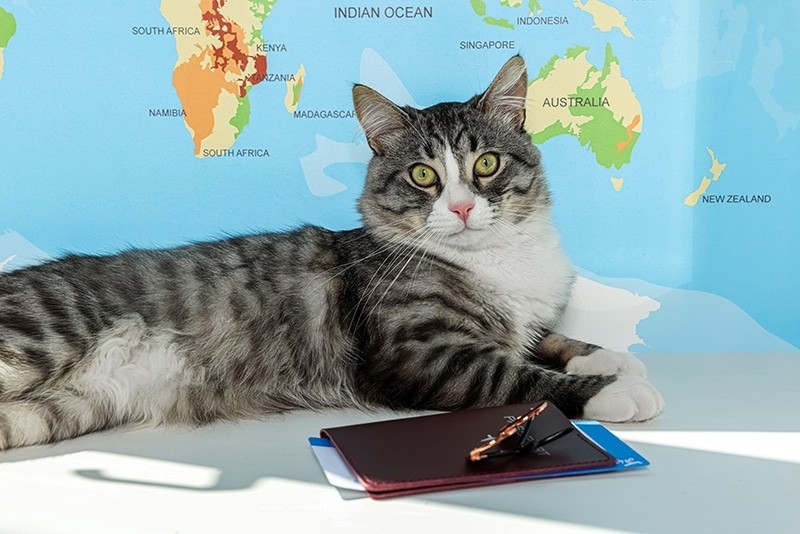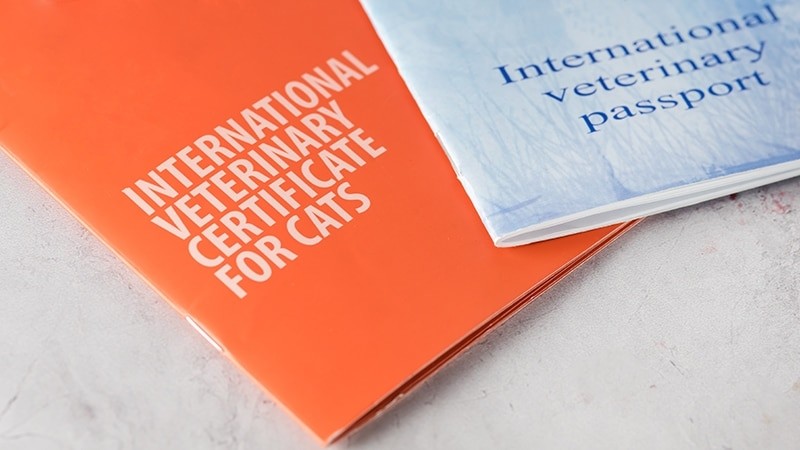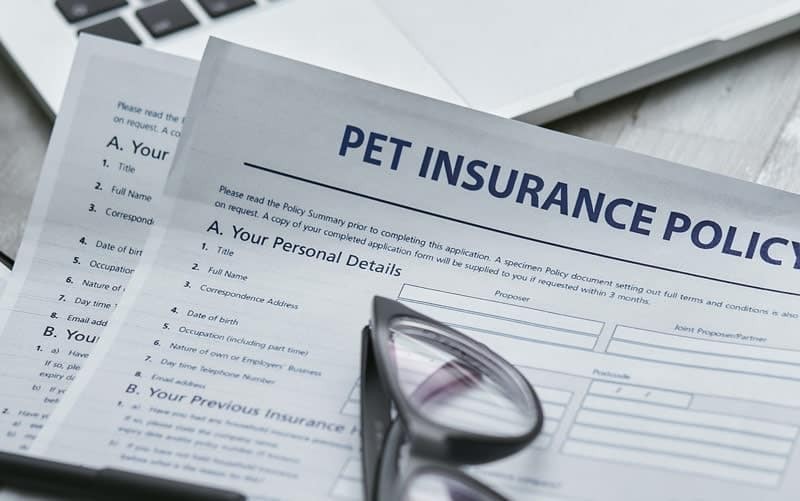How much is a pet passport? Traveling internationally with your beloved pet requires careful planning, and understanding the costs associated with obtaining a pet passport is crucial. PETS.EDU.VN is here to guide you through the process, ensuring your furry friend is ready for adventure. Securing proper travel documents and understanding international pet travel requirements is a breeze with expert guidance and resources.
1. Understanding the Importance of a Pet Passport
A pet passport is essentially a collection of documents that verify your pet’s health and vaccination records, allowing them to travel internationally. Different countries have different requirements, and a pet passport ensures that your pet meets these requirements, preventing potential issues at the border. For example, the European Union requires pets to have a microchip, a valid rabies vaccination, and an EU health certificate. Having a pet passport streamlines the entire process, making travel less stressful for both you and your pet. Always consult the official government website of your destination country for the most up-to-date and specific requirements.
2. Decoding the Costs of a US Pet Passport
The cost of a US pet passport can vary widely depending on several factors, including the destination country, the type of pet, and any required vaccinations or tests. The USDA endorsement fee is a primary cost.
2.1. USDA Endorsement Fees
The United States Department of Agriculture (USDA) charges a fee for endorsing your pet’s travel documents. As of the latest information, the standard USDA endorsement fee is around $38 per endorsement certificate, regardless of the number of pets. However, this is just one component of the overall cost. This fee covers the administrative process of verifying and approving your pet’s health documents for international travel.
2.2. Lab Test Fees
Depending on the destination country, your pet may require specific lab tests to ensure they are free from certain diseases. The USDA charges additional fees for handling lab test results.
| Number of Lab Tests | Fee |
|---|---|
| 0 | $38 |
| 1–2 | $121 |
| 3–6 | $150 |
| 7 or more | $173 |



These fees are in addition to the costs associated with the lab tests themselves, which can vary widely depending on the test.
2.3. Vaccination and Veterinary Examination Costs
Before you can obtain a pet passport, your pet needs to be up-to-date on all required vaccinations. A rabies vaccine can cost between $15 and $20 for a 1-year vaccine. Routine checkups range from $50 to $250, depending on the veterinary practice and services needed. These costs are essential for ensuring your pet’s health and eligibility for international travel. Regular veterinary visits help detect and prevent potential health issues, ensuring your pet is fit for travel.
3. Step-by-Step Guide to Obtaining a US Pet Passport
Getting a pet passport involves several steps. This ensures that your pet is healthy and meets all the necessary requirements for international travel.
3.1. Research Destination Country Requirements
Start by researching the specific requirements of the country you plan to visit. Each country has its own set of rules and regulations regarding pet entry. This includes required vaccinations, health certificates, and any specific tests.
3.2. Consult with Your Veterinarian
Schedule an appointment with your veterinarian to discuss your travel plans. Your vet can advise you on the necessary vaccinations, tests, and health certificates required for your destination. They can also perform a thorough health examination to ensure your pet is fit to travel. Your veterinarian can also guide you through the specific health requirements of the destination country and provide the necessary documentation.
3.3. Gather Necessary Documents
Collect all the required documents, including vaccination records, health certificates, and any lab test results. Make sure all documents are complete and accurate. Any missing or incorrect information can delay the process. The USDA endorsement certificate is a crucial document, so ensure you have all the necessary paperwork to obtain it.
3.4. Submit Documents to the USDA
Submit your pet’s documents to the USDA for endorsement, along with the required fees. You can submit the documents either by mail or in person at a USDA office. Ensure you follow all instructions carefully to avoid any delays. The USDA will review your documents and, if everything is in order, issue an endorsement certificate for your pet.
3.5. Microchipping
Ensure your pet has a microchip that complies with ISO standards (15-digit). This is often a mandatory requirement for many countries. The microchip helps in identifying your pet and linking them to their health records. Ensure the microchip is registered with your contact information.
3.6. Rabies Vaccination
A valid rabies vaccination is almost always required. The vaccination must be administered by a licensed veterinarian and documented properly. Depending on the destination, there may be specific rules regarding the timing of the vaccination. Some countries require the vaccination to be administered at least 30 days before travel.
3.7. Health Certificate
Obtain an official health certificate from a USDA-accredited veterinarian. This certificate confirms that your pet is healthy and free from any signs of infectious diseases. The health certificate is usually valid for a limited time, so ensure you obtain it close to your travel date. The certificate must be endorsed by the USDA to be valid for international travel.
3.8. Additional Vaccinations and Tests
Depending on the destination country, your pet may need additional vaccinations and tests. Common requirements include tests for heartworm, ehrlichiosis, and leptospirosis. Ensure you comply with all these requirements to avoid any issues upon arrival. Some countries also require a parasite treatment before entry.
3.9. Import Permit
Some countries require an import permit before your pet can enter. Check with the destination country’s embassy or consulate to determine if an import permit is necessary. Apply for the permit well in advance of your travel date, as processing times can vary.
3.10. Quarantine Requirements
Be aware of any quarantine requirements in the destination country. Some countries require pets to undergo a period of quarantine upon arrival to ensure they are free from diseases. Quarantine periods can vary from a few days to several months, so it’s essential to be prepared. Check with the destination country’s authorities for the latest quarantine regulations.
4. Pet Insurance and Pet Passports: What You Need to Know
Most pet insurance plans don’t cover the costs associated with obtaining a pet passport. Standard accident and illness plans generally focus on unexpected medical expenses rather than routine or preventative care.
4.1. Wellness Plans
Some pet insurance companies offer wellness plans that cover routine care costs, including annual health exams, vaccinations, and preventative diagnostic testing. If you’re interested in enrolling your pet in a plan to help cover these costs, opt for a wellness plan. These plans can help offset some of the expenses associated with preparing your pet for international travel.
4.2. Wellness Riders
Some pet insurance companies also offer wellness riders that can be added to an accident and illness plan. These riders provide coverage for preventative care, helping you manage the costs of vaccinations and routine checkups. Review your pet insurance policy carefully to understand what is covered. It will not cover application fees or postage.
5. Other Essential Requirements for International Pet Travel
Besides the core pet passport requirements, you need to consider additional factors to ensure smooth travel.
5.1. Airline Regulations
Each airline has its own set of rules and regulations regarding pet travel. Some airlines allow small pets to travel in the cabin, while others require pets to travel in the cargo area. Check with your airline well in advance to understand their specific requirements, including size and weight restrictions for in-cabin travel. Some airlines also require a health certificate issued within a certain timeframe before departure.
5.2. Breed Restrictions
Some airlines and countries have breed restrictions, particularly for certain dog breeds. These restrictions may prohibit the transport of certain breeds or require additional documentation. Check with your airline and destination country to ensure your pet is not subject to any breed restrictions.
5.3. Acclimation Certificate
Airlines may require an acclimation certificate stating that your pet is acclimated to the temperature conditions at the origin and destination airports. This certificate must be issued by a veterinarian. Be aware of seasonal temperature restrictions that may affect your pet’s ability to travel. Airlines may refuse to transport pets if temperatures are too high or too low.
5.4. CITES Permits
If you plan to travel with an exotic pet, such as certain birds or reptiles, you may need a CITES (Convention on International Trade in Endangered Species) permit. This permit ensures that the trade of endangered species is regulated and does not threaten their survival. Check with the CITES authorities in your country to determine if a permit is required for your pet.
5.5. Sedation
The American Veterinary Medical Association (AVMA) does not recommend sedating pets for air travel. Sedation can increase the risk of respiratory and cardiovascular problems during flight. If you are considering sedating your pet, discuss the risks and benefits with your veterinarian. There are alternative ways to help your pet stay calm during travel, such as using calming pheromone sprays or providing a familiar blanket or toy.
5.6. Pet Carrier
Ensure your pet has a comfortable and airline-approved carrier. The carrier should be well-ventilated and large enough for your pet to stand, turn around, and lie down comfortably. Label the carrier with your name, address, phone number, and destination information. Familiarize your pet with the carrier before the trip to reduce stress during travel.
5.7. Food and Water
Bring enough food and water for your pet during the journey. Pack collapsible bowls and water bottles for easy access. Airlines may have restrictions on the type and amount of food and water you can bring on board. Consider bringing a small amount of your pet’s favorite food to encourage them to eat during travel.
5.8. Comfort Items
Pack some of your pet’s favorite toys, blankets, or other comfort items to help them feel more secure during travel. These items can provide a sense of familiarity and reduce anxiety. Avoid bringing items that could pose a choking hazard.
5.9. Travel Insurance
Consider purchasing travel insurance for your pet. This insurance can cover unexpected medical expenses, loss, or theft during travel. Review the policy carefully to understand the coverage limits and exclusions. Some travel insurance policies also offer coverage for trip cancellation or interruption due to pet-related issues.
6. Real-World Examples of Pet Passport Costs
To give you a clearer idea of the potential costs, here are a few real-world examples.
6.1. Traveling to the EU from the US
For a dog traveling from the US to the EU, you’ll need a microchip, a rabies vaccination, an EU health certificate, and USDA endorsement. The costs might break down as follows:
- Microchip: $50
- Rabies Vaccination: $20
- EU Health Certificate: $150
- USDA Endorsement: $38
- Total: $258
6.2. Traveling to Australia from the US
Australia has very strict import requirements. Pets may need multiple tests to ensure they are free from specific diseases.
- Microchip: $50
- Rabies Vaccination: $20
- RNAT Test: $200
- Additional Blood Tests: $300
- USDA Endorsement: $173
- Total: $743
6.3. Traveling with a Service Dog
Service dogs are often exempt from certain fees, but documentation and health requirements still apply.
- Microchip: $50
- Rabies Vaccination: $20
- Health Certificate: $150
- USDA Endorsement: $0 (Fee Waived)
- Total: $220
7. Essential Tips for a Smooth Pet Passport Process
Navigating the pet passport process can be complex, but with the right approach, it can be manageable.
7.1. Start Early
Begin the pet passport process well in advance of your travel dates. Some requirements, such as certain vaccinations and tests, need to be completed weeks or months before travel. Starting early allows you plenty of time to gather the necessary documents and address any potential issues.
7.2. Use a Checklist
Create a checklist of all the requirements for your destination country and use it to track your progress. This will help you stay organized and ensure you don’t miss any steps. Update the checklist as you complete each task.
7.3. Keep Copies
Make copies of all your pet’s travel documents and store them separately from the originals. This ensures you have backup copies in case the originals are lost or stolen. Keep digital copies as well.
7.4. Stay Informed
Pet travel regulations can change, so it’s important to stay informed. Check the official government websites of your destination country for the latest updates. Subscribe to travel advisories and follow relevant social media accounts for real-time information.
7.5. Work with Experts
Consider working with a USDA-accredited veterinarian or a pet travel agency. These experts can guide you through the process and help you avoid common pitfalls. They can also assist with document preparation and submission.
8. Key Resources for Pet Owners
Numerous resources are available to help pet owners navigate the international travel process.
8.1. USDA APHIS Website
The USDA Animal and Plant Health Inspection Service (APHIS) website provides comprehensive information on pet travel regulations.
8.2. Destination Country Embassies
Contact the embassy or consulate of your destination country for specific requirements and regulations.
8.3. Pet Travel Agencies
Pet travel agencies specialize in arranging international travel for pets. They can handle everything from document preparation to transportation logistics.
8.4. Online Forums and Communities
Online forums and communities dedicated to pet travel can provide valuable insights and tips from other pet owners.
9. Addressing Common Challenges in Obtaining a Pet Passport
Despite careful planning, challenges can arise during the pet passport process. Knowing how to address these challenges can help you avoid delays and complications.
9.1. Document Discrepancies
Ensure all documents are accurate and consistent. Any discrepancies can lead to delays or rejection. Double-check all information before submitting your documents.
9.2. Vaccination Timelines
Adhere to the specified vaccination timelines. Some countries require vaccinations to be administered within a certain timeframe before travel. Plan accordingly to ensure you meet these requirements.
9.3. Unexpected Health Issues
Be prepared for unexpected health issues that may arise during the pet passport process. Schedule regular veterinary checkups to detect and address any potential problems.
9.4. Logistical Challenges
Anticipate logistical challenges, such as transportation delays or unexpected quarantine requirements. Have a backup plan in place to address these issues.
10. Frequently Asked Questions (FAQs) About Pet Passports
Here are some frequently asked questions about pet passports to help you navigate the process.
10.1. What is a pet passport?
A pet passport is a collection of documents that verify your pet’s health and vaccination records, allowing them to travel internationally.
10.2. How much does a pet passport cost?
The cost varies depending on the destination country, required tests, and vaccinations, but typically ranges from $200 to $800 or more.
10.3. What documents are typically required for a pet passport?
Required documents include a microchip, rabies vaccination, health certificate, and USDA endorsement.
10.4. How long does it take to get a pet passport?
The timeline varies, but it’s best to start the process several months before your travel date.
10.5. Does pet insurance cover pet passport costs?
Most standard pet insurance plans do not cover pet passport costs, but some wellness plans may cover routine vaccinations and checkups.
10.6. Can I travel with my pet without a pet passport?
Traveling without a pet passport can result in your pet being denied entry into the destination country or being subject to quarantine.
10.7. Are there breed restrictions for international pet travel?
Some airlines and countries have breed restrictions, particularly for certain dog breeds. Check with your airline and destination country for specific restrictions.
10.8. Do service dogs need pet passports?
Yes, service dogs need pet passports to travel internationally. While some fees may be waived, documentation and health requirements still apply.
10.9. What is a USDA endorsement?
A USDA endorsement is an official verification of your pet’s health documents by the United States Department of Agriculture.
10.10. Where can I find a USDA-accredited veterinarian?
You can find a USDA-accredited veterinarian through the USDA APHIS website.
Obtaining a pet passport involves time, research, and careful planning. While the costs can vary, being prepared and informed can make the process smoother. By following the steps outlined in this guide and seeking expert advice, you can ensure your beloved pet is ready for international travel.
Planning to travel with your pet can be an exciting adventure. At PETS.EDU.VN, we understand the importance of having your furry friend by your side, and we are here to support you every step of the way. Navigating the complexities of pet passports, vaccinations, and international travel requirements can be overwhelming, but with our comprehensive resources and expert guidance, you can ensure a smooth and stress-free journey for you and your pet.
Do you want to learn more about specific country requirements, find a trusted USDA-accredited veterinarian, or get personalized advice for your pet’s travel needs? Visit PETS.EDU.VN today. Our extensive database provides in-depth information on pet travel regulations worldwide, helping you prepare for your trip with confidence. From vaccination schedules to import permits, we’ve got you covered.
For immediate assistance and expert consultations, reach out to us at 789 Paw Lane, Petville, CA 91234, United States, or give us a call on Whatsapp at +1 555-987-6543. Our dedicated team is ready to answer your questions and provide tailored solutions to meet your specific needs. At pets.edu.vn, we are committed to making pet travel accessible, safe, and enjoyable for everyone. Your pet’s adventure starts here.
